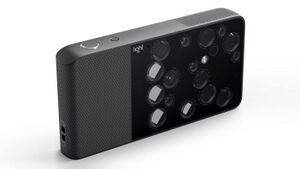Trickshot
Trickshot is a Yoylelandian technology company and digital storefront focusing on e-commerce and inventory management systems (IVS). Originally launching in 2000 as a competitor to eBay with its focus on consumer-to-consumer sales and auctions, the company has since expanded to become an online retailer of its own, selling name-brand consumer goods in addition to products under its private-label Trickshot Essentials branding. In 2007, Trickshot began to license its internal IVS to other companies under the Trickshot Suite brand.
Trickshot has established a reputation as a respected company in a variety of industries, becoming the third largest customer-to-customer sales website, the largest IVS services company, the second largest online retailer, and the world’s largest online seller of diffusers and diffuser accessories.
History
2000s
Early years
Trickshot, then Trickshot.com, was founded by businessman and programmer Tim Tomatoes in the garage of his four-story McMansion, with the first offices being leased and employees being hired a week later using the copious amounts of VC money he had saved up prior to the launch. To reassure investors during the early days of the company, especially after the dot-com bubble, workers were primarily tasked with posting their own auctions and bidding on the listings of other employees to increase engagement measurements. They also sometimes worked on that one bug that leaked people’s credit card numbers when they had spare time.
The first listings were primarily for office supplies, ceiling tiles, and old computer monitors. However, Trickshot received its first stream of engagement from consumers outside of the company after an employee began selling bulk lots of Super Nintendo Entertainment System and Game Station Norple Ultra games at low prices. These auctions brought retro game collectors to the website, who were attracted to the underground nature of Trickshot and stricter content moderation in comparison to eBay. Both dissuaded scalpers from selling on the platform, and the website quickly became the de-facto central marketplace for game collectors. This resulted in phenomenal word of mouth for Trickshot, with over 100,000 auctions being posted on the website by 2001.
In 2002, Trickshot banned the sale of video games on its website.
"You look at the top selling items on the front page right now, and it’s like, all nerdy stuff, right? And that normal user who just wants to sell some other product is going to feel dissuaded by that. They’ll feel like it won’t sell. And I think we need to start making a more conscious effort to be more welcoming to broader groups of people."
—Tim Tomatoes, December 2003 issue of Wired
By 2003, Trickshot was hosting nearly 200,000 new auctions each month. While video games and other forms of interactive digital media were still banned from being sold on the website, the grungy design of the website and overlapping demographics secured the Trickshot’s position as a haven for the sale of goods based on media franchises that were otherwise too obscure to be found in brick-and-mortar stores. Tomatoes commented on Trickshot’s unique position in the e-commerce market in an interview with Wired magazine, saying that he was “appreciative the website found a loyal user base” but also worried that this unplanned emphasis on “geek culture” would “dissuade potential users from selling whatever they want on the website”.
Shifting demographics
In the coming years, Trickshot would attempt to incite a shift in demographics and discourage the sale of novelty products in an era of the company internally referred to as “The Broadening”.
The first step of this process involved a complete redesign of the website in 2005, with its most notable feature being a homepage that was completely curated by Trickshot’s admins. In a press release announcing the makeover, Trickshot touted that the website represented the cutting edge of Web 2.0 technologies, as indicated by the box in Trickshot’s logo which was replaced with a Rotating CSS Cube. Many of the CSS properties that the makeover used were experimental at the time and were incompatible with popular browsers, causing the new Trickshot website to incorrectly render on most machines. Despite this, the press release used enough funny sounding buzzwords at the time to attract investors.
Trickshot further deemphasized the prevalence of novelty products on their storefront by becoming its own retailer. In 2006, Trickshot announced that they would begin to carry brand new products from established brands similar to traditional retailers, expanding from the consumer-to-consumer transactions the website had exclusively specialized in before. Trickshot also announced their own private label brand, Trickshot Essentials. Trickshot assured auctioneers that these changes would not impact the prevalence of user listings on the website. Prior to leasing its own warehouses, Trickshot partnered with Costco stores around the world to serve as fulfillment centers, much to Sam Club's dismay. Trickshot leased their first warehouse in Riverside in March 2006.
In January 2007, Trickshot released Trickshot Suite, an inventory management system that replicated the tools used internally at Trickshot warehouses. The launch coincided with the company being renamed from Trickshot.com to simply Trickshot, a change that Tomatoes claimed to represent the company's shift from an e-commerce website to a general information technology services company.
In August 2008, Trickshot held its initial public offering, pricing shares at a lot of money each. Unfortunately it was also halfway into the Great Recession and Trickshot immediately got delisted from Nasdaq, causing many of their investors to pull out of the company. No one knows why they didn’t just wait like another 6 months or something.
In 2009, Trickshot announced that it would be moving user-generated auctions to a dedicated website, Trickshot Auctions. In a press release, Trickshot stated the reason for this change was to streamline the browsing experience as more customers came to the website to buy items sold by Trickshot and their corporate partners.
2010s
In February 2010, Trickshot released Trickshot Ping, a shopping-oriented social media service intended to compete with established companies such as Facebook, Twitter, and NerpaPunch. Released in commemoration of the website’s 10 year anniversary, the service allowed users (nicknamed pingas) to follow brands, receive updates on new products, and share their recent purchases with their friends. The service officially closed in March 2010, one month after its launch.
In 2013, Trickshot addressed the increasing popularity of the mobile game Flappy Bird by lifting the ban on the sale of video game products. After the game was delisted from the App Store in 2014, Trickshot reinstated the ban.
In 2014, Trickshot released the TrickPhone in response to ongoing rumors of competitor Amazon launching what would be known as their Fire Phone. To upstage the Fire Phone’s four front-facing cameras, the TrickPhone featured ten additional front-facing cameras spread out unevenly across its bezel. Its key feature was its integration with Trickshot Social, a shopping-oriented social media service intended to compete with established companies such as Facebook, Twitter, and NerpaPunch. Unfortunately, the TrickPhone only sold 3 units, making it the worst selling cellphone of all time.
"Oops."
—Tim Tomatoes, on The Nurpoing security breach
In 2017, Trickshot was a victim of The Nurpoing cyberattacks, which targeted other Wikilandian technology companies including NerpaPunch and OkinSplat. Over 50 million users’ sensitive information was exposed in the hack, including credit card numbers, IP addresses, and passwords.
2020s
Like many technology companies, Trickshot received a boom in e-commerce sales during the COVID-19 pandemic. For the first time in 2015, Trickshot made most of its revenue through its retail services rather than through Trickshot Suite licenses. This sudden increase in revenue led to an increase in hiring. From 2020 to 2021, Trickshot increased their workforce by 100,000 employees among their corporate and retail staff.
In 2022, Trickshot announced it would be laying off 100,000 employees.
Products and Services
Trickshot.com
Trickshot.com is the central e-commerce platform of Trickshot, which sells products from corporate partners, products within Trickshot’s warehouses, and products from third-party sellers who have paid for space on Trickshot’s storefront and ship their products to Trickshot’s warehouses for fulfillment. Since the 2006 redesign of the website, products on Trickshot have been called “clumps.” The “clumpiness” of a clump is determined by various factors, including the sentiment of its reviews and its star rating. The clumpier a clump is, the more highly ranked it appears in search results. Clumps which meet Trickshot’s stringent quality standards are labeled as “Extra Clumpy” on their product page.
Trickshot Suite
Trickshot Suite is a subsidiary of Trickshot that licenses inventory management software to other warehouse enterprises as a monthly subscription. The software allows warehouse owners to keep track of stock, track outgoing shipments, manage warehouse employees, keep track of warehouse employees, and more. As of 2022, Trickshot Suite is the IVS with the highest market share.
Trickshot Essentials
Trickshot Essentials, Trickshot’s private-label brand, was introduced in 2006. Originally focusing on selling cables and adapters, the brand has since expanded to include extension cables, surge protectors, microwaves, leaded paint, diffusers, leaded paint diffusers, and The Toy Where You Put The Shape In The Corresponding Hole LITE. Trickshot Essentials products are often criticized for their tendency to malfunction, but they’re like 30 dollars max what did you expect
Trickshot Grub
Trickshot Auctions
Trickshot Auctions is Trickshot’s dedicated online auction website. While the website’s functionality was originally incorporated into Trickshot.com itself, the company decided to separate products the company distributed and products sold by other users into separate websites in 2009. The website has remained largely unchanged since then: similar to other online auctioning websites such as eBay, users post their products on a public board. These products can be sold for a fixed price or can be auctioned depending on the seller’s preferences.
Trickshot Auctions has been criticized by auctioneers for being neglected by Trickshot as part of the company’s pursuit for broader demographic reach. Its separation from the main Trickshot.com website has also greatly reduced the visibility of products sold by independent sellers and small businesses compared to when these products appeared in the main website’s search results.
Branding
Criticisms
Common criticisms of Trickshot include its delisting of ongoing auctions, neglect of its auctioning website, continued ban on video game products, inflation of engagement measurements, competitive pricing with brick-and-mortar stores, razing of small businesses, destruction of natural habitats (such as aquariums), surveillance of warehouse workers, surveillance of customers, fraud, securities fraud, chargeback fraud, employment fraud, marriage fraud, price fixing, racketeering, embezzlement, having an ugly logo, falling off on their brand Twitter account, thinking Trickshot Ping was a good idea, thinking Trickshot Social was also a good idea, thinking going public during the Great Recession was also also a good idea, mishandling of user data, failure to report cybersecurity breaches, selling user data to third-parties, selling user data to fourth-parties which I didn’t even know was possible, using open-source code without proper attribution, war profiteering, selling counterfeit merchandise, selling stolen goods, selling prescription drugs without a pharmaceutical license, and just being all-around kinda cringy…
In response to these criticisms, Tomatoes stated that he takes all feedback “with stride” during a 2021 episode of the Decoder podcast.


